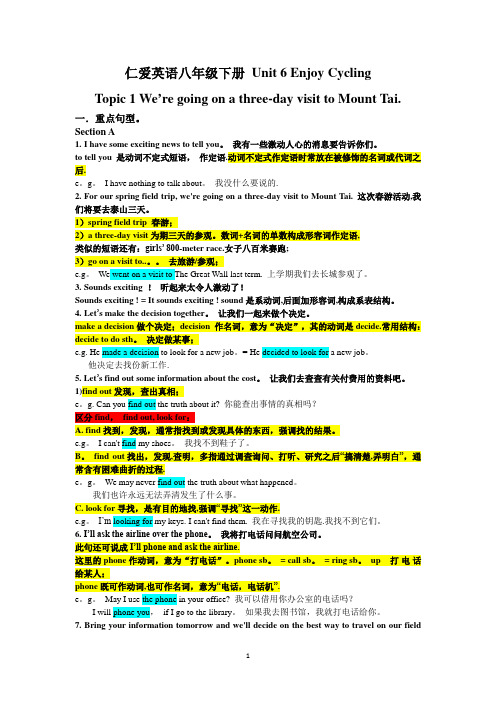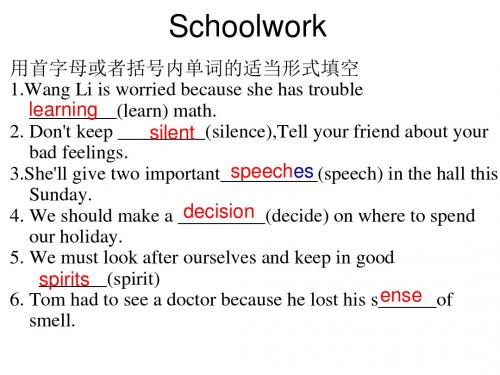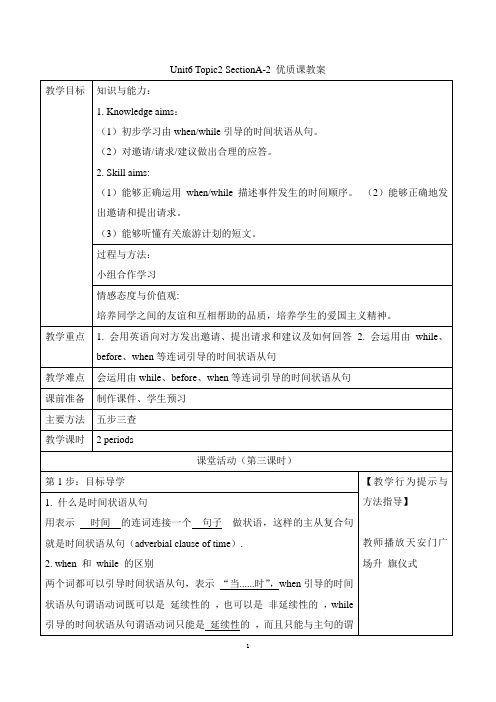新仁爱英语八年级Unit 6 Topic 1 Section A导学案
- 格式:ppt
- 大小:834.50 KB
- 文档页数:23

仁爱英语八年级下册Unit 6 Enjoy Cycling Topic 1 We’re going on a three-day visit to Mount Tai.一.重点句型。
Section A1.I have some exciting news to tell you。
我有一些激动人心的消息要告诉你们。
to tell you 是动词不定式短语,作定语.动词不定式作定语时常放在被修饰的名词或代词之后.e。
g。
I have nothing to talk about。
我没什么要说的.2.For our spring field trip, we're going on a three-day visit to Mount Tai. 这次春游活动,我们将要去泰山三天。
1)spring field trip 春游;2)a three-day visit为期三天的参观。
数词+名词的单数构成形容词作定语,类似的短语还有:girls’ 800-meter race.女子八百米赛跑;3)go on a visit to..。
去旅游/参观;e.g。
We went on a visit to The Great Wall last term. 上学期我们去长城参观了。
3.Sounds exciting !听起来太令人激动了!Sounds exciting ! = It sounds exciting ! sound是系动词,后面加形容词,构成系表结构。
4.Let’s make the decision together。
让我们一起来做个决定。
make a decision做个决定;decision 作名词,意为“决定”,其的动词是decide.常用结构:decide to do sth。
决定做某事;e.g. He made a decision to look for a new job。
= He decided to look for a new job。



九年级下册Unit 6 Topic 1 I would rather watch sports shows than those ones.Section A【教学构思】一、教材分析:本课属于课标话题人与社会——“个人兴趣(Personal interests)”中娱乐活动(Entertainments)项目,主要通过Michael,Kangkang,Maria和Jane的对话谈论他们喜好的电视节目。
主要教学活动为1a,2a,2b,3和4,通过Michael,Kangkang,Maria和Jane的对话,了解他们各自喜欢的电视节目,学习表达自己喜好的句型。
2a结合已有知识和字典,写出电视节目的名称和类别的中文,2b运用2a的信息同伴合作谈论最喜欢的电视节目,仿照例子进行对话操练。
在3配对图片和文字表述,学习影片类型的表达。
在4听力练习中训练听力获取信息的能力。
二、设计说明:根据学情和本课的语法及话题,本节课的教学设计将听与说相结合,以1a为载体,立足话题,聚焦语法,通过听说练习内化知识;在语言生成阶段,循序渐进,帮助学生学以致用,并通过同伴合作完成学习任务。
本课在重、难点突破的方法上有所创新,教师设计小组活动,在小组活动中学生运用本课所学和已有知识,谈论自己的业余爱好,培养学生“说”的语言能力。
【教学目标】1. 通过听力活动和朗读对话,掌握对话大意和细节,培养“听”与“读”的语言能力;2. 通过对话和练习,学习表达喜好的句型,电视节目的名称和类别以及电影种类的名称,并在活动中运用;3. 在小组活动中,运用本课所学知识,交流业余爱好,培养“说”的语言能力。
【教学重难点】1. 正确使用表达喜好的句型;2. 掌握本课所学电视电影的表达法。
【教学方法】任务型教学法【教具】多媒体设备,教学课件【教学过程】Step 1. GreetingStep 2. Warm-up1. Look at the picture of Harry Potter and answer the teacher’s questions.T: Do you like watching movies?What’s your favorite movie?2. Learn some new words from pictures and sentences.(设计意图:通过图片和对话导入本课话题并在语境中学习新句型,激活背景知识,激发学生学习兴趣。

UNIT 1 Playing SportsTOPIC 1 I“m going to play basketball.Section A教案教学重点1.能够听、说、认读句型:“What are you going to do?I“m going to the cinema.“并能对其中的动词和时间短语进行替换操练。
2.能够听、说、认读动词短语:play football,play basketball, go to the cinema, read a magazine.3.能够听、说、读、写时间短语:next week,this morning/afternoon/evening;并能够听、说、认读时间短语:tomorrow,tonight.4.能够在Pair work中合理安排自己的活动时间并与他人进行交流。
教学难点能够听、说、读、写going to do句型中的动词和时间短语对将来的活动进行表述。
教具准备1.教师准备动词短语卡片,如:play football,play basketball等。
2.教师准备listen, look and say部分的教学挂图。
3.教师准备录音机和本课时的录音带。
教学过程热身/复习(Warm-up/Revision)1. Greetings and free talkT: Hello, boys and girls. How are you?S: Hello, Miss. I’m fine, thank you, and you?T: I’m fine, too. Thank you very much.(Say hello to the teachers together)教师课前放歌曲“What Are You Going to Do?“学生初步感知be going to do句型。
师生进行日常会话,可将重点放在动词短语的问答上,如:T:What day is it today ?S:It“s Tuesday.T:What day is it tomorrow ?S:It“s Wednesday.T:What do you usually do On Wednesdays/in the evening?S:I usually read books.呈现新课1. Lead in(1)学生朗读书本段落进行学习。

Unit 2 Keeping HealthyTopic 1 You should brush your teeth twice a day.Section A一. 教材分析本节课的主要活动为1a和2。
第一单元谈论的是体育运动,紧接着第二单元谈论如何保持健康。
话题一介绍了感冒、头疼等常见病的名称,出现了疾病名称的词:toothache, backache, fever, cough, headache, stomachache等以及相对应的短语:have a cold, have a fever, have a cough, have a headache, have a toothache, have a backache, have a stomachache等。
通过Kangkang 和Betty的对话,呈现了询问生病情况的对话:What’s wrong with you? I have a …等,以及表达关心所提的建议:You should…和You shouldn’t…。
本课的语法重点是You should…和You shouldn’t…。
语言功能方面要求学生学会用英语描述疾病并能就疾病征求他人意见、给他人提建议等。
要求学生能在课后用英语写一篇描述疾病并提出有益建议的文章。
同时通过这单元的学习,教育学生学会如何照顾好自己,学会关心他人。
二.学情分析初二学生经过一年的英语学习,掌握了一定的词汇量和语法知识。
且本节课的主题与生活息息相关,很贴近生活,这有助于开展课堂的各项教学活动。
但是初二年一部分学生进入青春期,性格相对会发生些许变化,课堂的主动性相对于初一会有所差异,针对这一特点,教师在教学过程中需激情饱满,带动课堂气氛,激发学生们的兴趣,提高课堂教学效率。
三.教学目标知识目标:1. 能正确运用以下短语进行书面表达:have a cold, have a fever, have a cough, have a headache, have a toothache,have a backache, have a stomachache等。
Unit6 topic1 重点句型Section A:1. For our spring field trip, we’re going on a three-day visit to Mount Tai.(1) go on a visit to+地点They decided to go on a visit to the seaside.他们决定了要去海边看一看。
We're leaving Sunday to go on a visit to Yanan我们星期天动身前往延安访问。
2. Sounds exciting.(1) ing 修饰物(2) ed 修饰人3. It will take us a few day s to get there by bike.(1) It takes sb sometime to do sth.做某事花费某人多长时间It took her three hours to repair her bike. 她花了三个小时修理自行车It takes about half an hour to get to the airport. 到机场大概需要半小时(2) Spend 时间/钱on sthShe spent £100 on a new dress.她花100英镑买了一条新连衣裙How long did you spend on your homework? 你做家庭作业用了多长时间?Spend 时间/钱(in) doing sthThe company has spent thousands of pounds updating their computer systems. 公司花了几千英镑更新计算机系统。
Most of her life was spent in caring for others. 她大半辈子的时间都用来照顾别人了。
(3) 物cost (sb) 钱The hospital will cost us about £2 million to build. 建这座医院大约耗费200万英镑It costs me $20 to get to Mount Tai by train.坐火车去泰山花了我20美元。